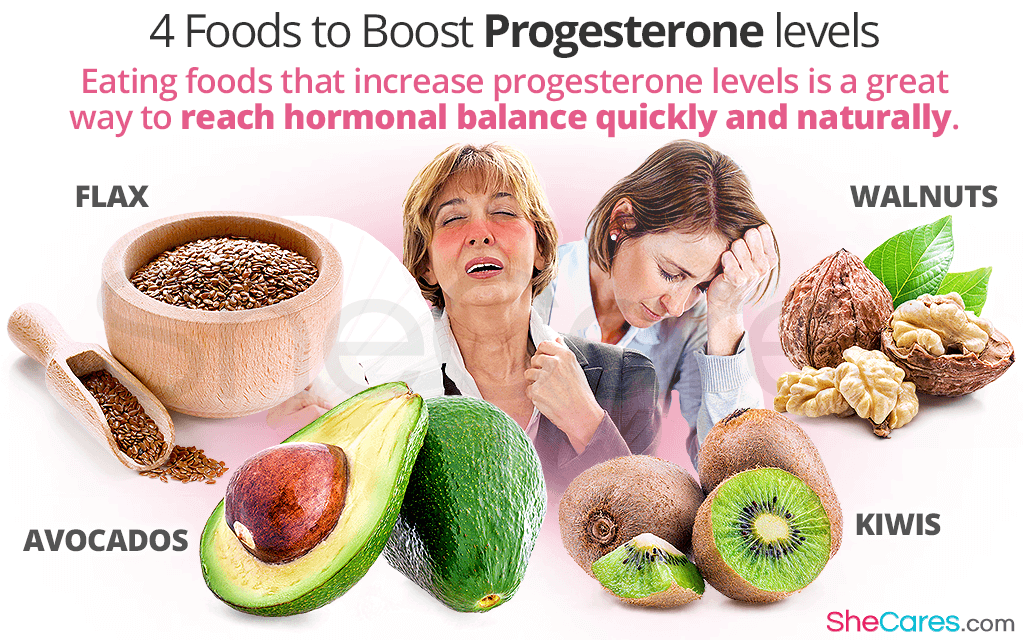Struggling with symptoms of low progesterone levels is no joke no matter the reproductive stage. Fortunately, women have a number of safe and effective ways to increase progesterone and free themselves from the struggle. And good news is that it all begins with the food they eat!
Read on to discover 4 foods to boost progesterone levels quickly and effectively for ultimate hormonal balance and a symptom-free life!
Flax
Among other key nutrients, flax contains phytoestrogens, which are weak plant-based compounds that fill in estrogen receptors in the body. By doing so, they help regulate the balance between estrogen and progesterone, resulting in increased progesterone levels and relief from symptoms of its imbalance.1 Other phytoestrogenic foods that increase progesterone include sunflower seeds, oats, yams, lentils, soy, and more!
Avocados
Avocados are another type of food that increase progesterone. They contain magnesium, which is one of the best minerals to regulate progesterone by supporting the functions of corpus luteum, a structure that is created after ovulation.2 It also helps the body handle elevated cortisol levels, which are released under stress instead of progesterone.3 Other magnesium-rich food sources include soy, dark leafy vegetables, legumes, and dried apricots.
Kiwis
Kiwis and other citrusy fruits are excellent sources of vitamin C, which also makes them adequate progesterone-boosting foods. The antioxidant vitamin consumption has been associated with higher progesterone concentrations and promoting a healthier balance between estrogen and progesterone.4 Additional vitamin C-rich natural foods to increase progesterone are pineapple, papaya, bell peppers, or orange.
Walnuts
Walnuts are a good example of progesterone-enhancing foods due to their content of vitamin B6. The vitamin has been found to modulate the activity of steroid hormones, including progesterone, which is key for maintaining overall hormonal balance in the body.5,6 Consider adding other vitamin B6-rich foods to your diet, such as eggs, fish, beef, chickpeas, carrots, or milk.
Conclusions
While exploring the benefits of foods for hormonal balance, it is worth taking a moment to consider other approaches to increase progesterone levels. It can consist of replacing unhealthy habits like smoking with more wholesome ones, reducing stress with yoga or meditation, and taking herbal supplements, like Macafem, to boost the body's natural hormone production and reach equilibrium safely and without the need for pharmaceutical interventions.
Sources
- Elsevier. (2016). Stress-induced increases in progesterone and cortisol in naturally cycling women. Retrieved November 19, 2019 from https://www.ncbi.nlm.nih.gov/pmc/articles/PMC5146195/
- FDA. (n.d.). Minerals. Retrieved November 19, 2019 from https://www.accessdata.fda.gov/scripts/interactivenutritionfactslabel/factsheets/vitamin_and_mineral_chart.pdf
- Magnesium research. (2017). Magnesium in the gynecological practice: a literature review. Retrieved November 19, 2019 from https://www.ncbi.nlm.nih.gov/pubmed/28392498
- Vitti, A. (2014). Woman Code. New York, NY: Harper Collins Publishers.
Footnotes:
- Frontiers in Neuroendocrinology. (2010). The pros and cons of phytoestrogens. Retrieved November 19, 2019 from https://www.ncbi.nlm.nih.gov/pmc/articles/PMC3074428/
- Briden, L. (2015). Period Repair Manual. Publisher: Author.
- Nutrients. (2017). The effects of magnesium supplementation on subjective anxiety and stress - a systematic review. Retrieved November 19, 2019 from https://www.ncbi.nlm.nih.gov/pmc/articles/PMC5452159/
- The Journal of Nutrition. (2016). Serum Antioxidants Are Associated with Serum Reproductive Hormones and Ovulation among Healthy Women. Retrieved November 19, 2019 from https://www.ncbi.nlm.nih.gov/pmc/articles/PMC4700980/
- National University of Natural Medicine. (2019). How to Boost Fertility Naturally. Retrieved November 19, 2019 from https://nunm.edu/2019/03/boost-fertility-naturally/#fn1
- Oregon State University. (2014). Vitamin B6. Retrieved November 19, 2019 from https://lpi.oregonstate.edu/mic/vitamins/vitamin-B6

